Why do I get a yeast infection before period?
You may be asking yourself why you’re getting bouts of vaginal yeast infection right before or after your period, or why your symptoms seem to go away with period.
This article will explain why it’s happening and what are the best ways to avoid getting yeast infections related to hormonal imbalance that you experience just before, during and after your period. I’ll also tell you what’s the best way to treat your vaginal yeast infection, even if you suffer from chronic, difficult to treat vaginal yeast infections. Keep reading!
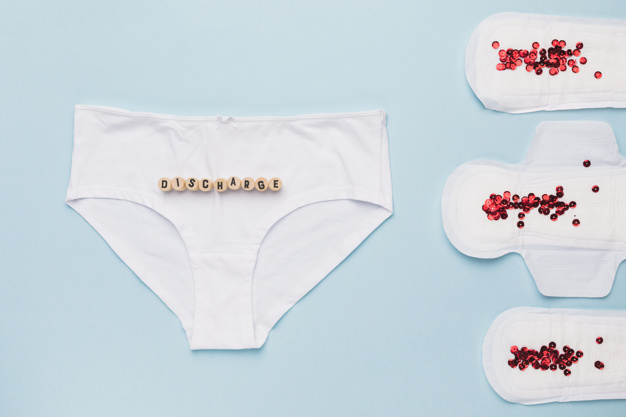
Why Hormonal Changes Trigger Yeast Infections?
Just before your period, the estrogen levels decrease. It lowers the pH in your vagina causing some of the friendly bacteria to die off. This creates a perfect environment for Candida to thrive.
What’s more, just after your ovulation progesterone levels go up and high levels of progesterone have been shown to weaken the immune system and your body’s ability to fight Candida decrease.
So it’s common to get a yeast infection before period because those hormonal changes lower your vaginal pH and your immunity providing a friendly environment for Candida to grow.
Read More: Do tampons cause a yeast infection?
Will yeast infection go away with a period?
You may be asking yourself if your yeast infection will go away with a period, so you don’t have to go to the doctor’s and get treatment. Are you hoping you’ll just put up with the itch for a few days and you’ll be fine? I’m afraid not.
The symptoms of a vaginal yeast infection may ease or even disappear completely during your period because blood flow changes the pH level in your vagina and Candida can’t grow in a high pH environment.
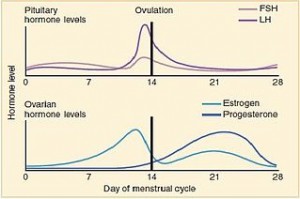
Straight after ovulation, the estrogen levels dip and progesterone levels rocket creating a perfect environment for Candida
However, if you don’t treat your vaginal yeast infection, the symptoms will most certainly come back once your period is over. It’s because many Candida cells will survive and will be able to multiply in no time, causing a new Candida bout.
- Read More: What Are The Best Reusable Menstrual Pads?
How to avoid getting a vaginal yeast infection around your period?
Use probiotic tampons during your period to help reestablish healthy vaginal flora preventing yeast from multiplying and producing nasty symptoms. If you want to learn more about probiotic tampons, check my full review of Saforelle tampons.
- Take probiotic supplements every day to help maintain healthy levels of friendly bacteria in your body. One of the best probiotic supplements for women is Garden of Life Raw Probiotics Women, it’s got an excellent selection of probiotic strains and a high CFU count, which makes it very effective. If you need more information, check my full review here.
- Use vaginal suppositories with probiotics twice a week to enhance the bacterial flora in your vagina and help keep Candida at bay.
- To further boost your probiotic intake, eat yogurt, kefir or other probiotic-rich foods every day.
- Avoid using scented soaps, bubble baths or intimate hygiene products because they can upset the pH level and bacteria balance in your vagina. Choose an intimate wash with all natural ingredients instead.
- Wear only 100% cotton underwear, and steer clear of leggings, tights and tight trousers which don’t allow air circulate freely around the vagina.
- Find more tips on avoiding vaginal yeast infections in my recent post.
What’s the Best Vaginal Yeast Infection Treatment?
The best over the counter treatment for vaginal yeast infection is boric acid. Boric suppositories are very effective and they work when other treatments fail.
It’s because boric acid is able to kill not only Candida albicans cells (the Candida strain that causes most vaginal yeast infections) but also Candida glabrata and Candida tropicalis, Candida strains that are difficult to treat with conventional over the counter medications.
If you order BoriCap before 2 pm, they’ll ship it on the same day, so you can start your vaginal yeast infection treatment as soon as possible.
- Read More: Can Menstrual Cup Cause a Yeast Infection?
Conclusion
Unfortunately, although your period can bring you temporary relief from symptoms, it will not make a vaginal yeast infection go away. But there are many things you can do to avoid getting it in the first place. Once you do get it, make sure you go to see your doctor and get diagnosed and treated.

You may also try using some natural remedies for vaginal yeast infection or over-the-counter antifungal medications after consulting your doctor.
If you’ve got any questions or comments, please share in the comment section below.
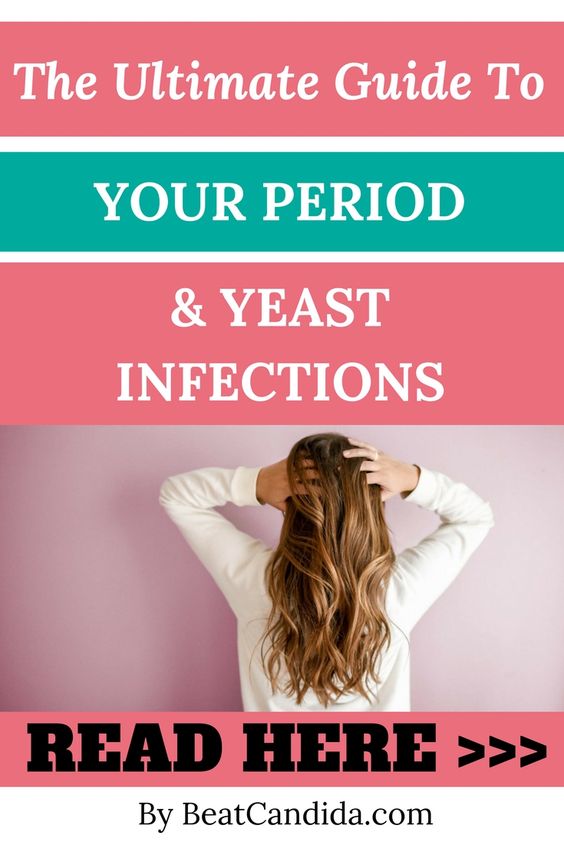

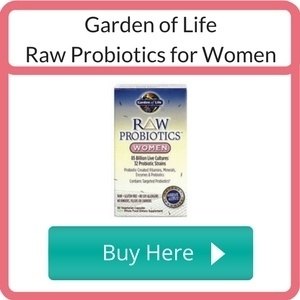
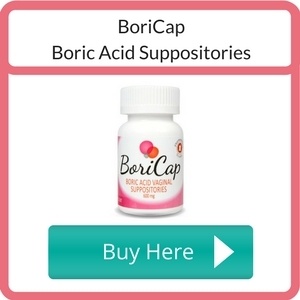
I went to the doctor as I had symptoms of a yeast infection the doctor said I had irritation but I don’t think I have irritation as I am suffering nearly 2 weeks now and I really think I have a yeast infection as my discharge is getting more and more I am having my periods in 1 week I hope that it then goes away. My vagina is itching a lot randomly but I can resist that. I am also going on holidays and I need to sit 2 days in a coach!!!! Will coconut oil help destroy the yeast infection? And how long will it take to clear up naturally I am suffering 2 weeks now the doctor said if the irritation hasn’t cured in a week then I need to come again but I didn’t tell my mom cause she is already stressed out and I didn’t want to be a burden for her pls someone help me
Hi Safah, coconut oil mixed with a few drops of tea tree oil or lavender oil will help you relieve symptoms of yeast infection and if you’ve only got an irritation, it will also have a soothing effect. Check my recipes for coconut oil suppositories and get well soon. All the best!
Wow this is a great article! I believe I might have yeast infection currently I’m
On my periods n it has eased out things. What is that I can do now so that after my period is over it doesn’t come back I mean the yeast infection? Thank you
Hi Huda, one of the most effective ways would be inserting one boric acid suppository straight after your period as a preventative measure. Another thing you can do is to use probiotic suppositories straight after your period for 7 consecutive days to rebuild the levels of healthy bacteria that will naturally protect you from infections.
I had a yeast infection some years ago. It lasted for a week and disappeared completely once I started menstruating. I’ve never been so glad to get my period.
I agree with mostly everything you have mentioned above. I’m not sure if sufficient research has been done, though, as I cannot find sources that are cited. Anyways, a female’s body has the ability to fight off a yeast infection by itself, especially when Mother Nature arrives. You can type it into Google and find research/articles, stating the yeast infection will go away on its own. Our bodies are extremely capable, and extremely complex. I’ve had two yeast infections my whole life. Both times, my body has fought it off, and within a couple of months I was back to normal. Like I said before, I agree with everything else you’ve stated. Great job!
Personally, I never heard such infection before. It’s something new for me.
I do know that lower pH means its acidic. I guess that’s the reason why alkaline is essential for health reasons.
Sounds to me it’s a recurring issue and to counter it is to look after the body overall.
Although it’s easily treated, I guess it shouldn’t be underestimated as it can be serious if taken lightly.
Thanks for giving such information, Kams! Oh, happy holidays and to a great 2016! – Tar
Tanks Tar. The symptoms of a vaginal yeast infection are extreme itchiness and pain, really hard to bear. But fortunately, apart from being painful the condition doesn’t pose a great health risk. Happy holidays to you too:)
You’re welcome, Kams. Noted on the effects that it can bring. Christmas lesson learnt today. Likewise on holiday festive wishes! – Tar
Thank you Tar, I’m glad you learnt a thing or two from my website. All the best!
I’ve just seen your article randomly. It has nothing to do with me as I’m a men but I like to read and learn about human body and female body is one of the most complex bodies, the same way understanding women is complex. I will suggest this blog to my girlfriend and I hope she will definitely find help. Thanks for writing this article and helping women.
Thanks Adeel. Helping women is the mission of this website. Before writing an article I do an extensive research to make sure the information I provide comes from reliable sources and is up-to-date. A vaginal yeast infection (especially if it’s recurring) is extremely unpleasant and can severely affect women’s mood, so it’s very important to find an effective treatment, be it medication or a natural remedy, as soon as the first symptoms set in.
I get frequent yeast infections and I have been searching for ways to naturally treat the yeast infections. I have been to my doctor and she prescribed Diflucan which is an oral antifungal medication. However, I experienced side effects such as stomach ache and headache when taking it. I learned so much from reading this article and I also read you article on natural cures for yeast infection. I always knew that coconut oil and lavender oil had benefits to help with calmness, but did not know about the benefits of curing yeast infections. I bookmarked this website so I could refer to it for future reference.
Hi Stephanie, I’m sorry to hear you got side effects from Diflucan, it’s a very effective antifungal and it’s a shame you cannot use it. However, there’re still quite a few different oral antifungal medications you could use, such as Itraconazole. Have you tried using the coconut and essential oil concoction? I hope it helped. All the best!